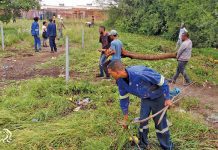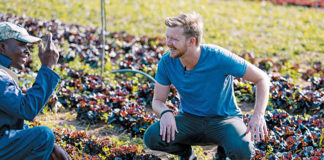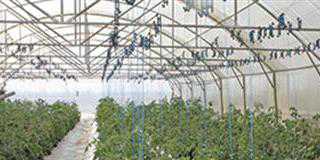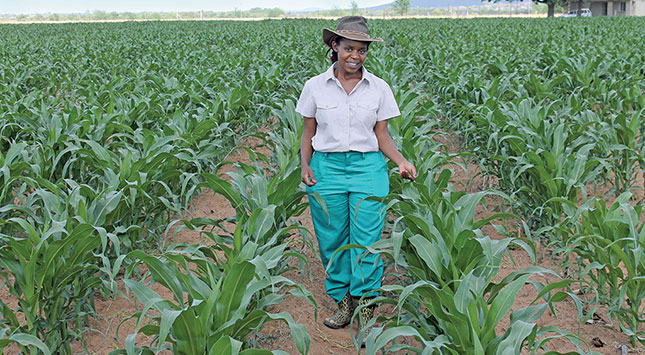
Thato Moagi started farming on a commercial scale only 22 months ago, and has already scooped several farming awards. The 24-year-old traded the upmarket suburb of Bedfordview in Johannesburg for a 50ha farm in Modimolle, Limpopo, bought by her parents, for R2,8 million, in December 2013.
Thato, who won this year’s awards for Limpopo’s Young Farmer of the Year and the DAFF Female Entrepreneur Awards commercial category with the Ministerial Award for Youth, is the farm manager of LeGae La Banareng Farms, a mixed farming operation comprising livestock, potato and maize crops, and an apiary.
Thato matriculated at the Assumption Convent School for Girls in Johannesburg in 2008, and is set to graduate from the University of Pretoria (UP) with a BSc. in plant science next year.
“I learnt all about farming at UP and got practical experience at our farm,” she says. “The farm was a Dorper stud farm when we bought it as a going concern. We then developed it by erecting central pivots for irrigation and fencing for security, and added Kalahari goats and cattle.”
Her parents, Molebatsi and Lerato, had been applying for funding from the Department of Rural Development and Land Reform for a long time, without success. “My father identified my ambitions and passion for nature and agriculture, so they saved up enough money and bought this farm.”
Thato enjoys mixed farming and says that a small-to-medium producer must ensure a stream of revenue. “You need to be able to make money all year round,” she says.
Crop production
In addition to 4ha planted to yellow maize for silage, 4ha is planted to the potato cultivar Innovato, for McCain South Africa, which supplies frozen chips to McDonalds restaurants and other fast food outlets. As part of their offtake agreement, which was facilitated by the local department of agriculture in Modimolle, the farm will supply McCain with 120t potatoes a season.
Some 10ha will be planted for the company in the next season.
“I’m looking for more land for potato production. McCain is willing to give me a long-term contract as long as I’ve got land and I keep on producing quality potatoes. Currently, they renew the contract on a yearly basis,” says Thato, who has put in applications for membership at Grain SA and Potatoes SA.
The agribusiness unit at the local department of agriculture in Modimolle pitched the deal to Thato, introducing her to key stakeholders McCain and Nulandis. She then applied to be a vendor for McCain.
“The department also sponsored the potato seeds, one of the key elements of the high production costs of potatoes,” Thato explains. “My seeding rate is 45 000 seeds/ ha (13t seeds/ ha). My spacing is 25cm between the potato seeds and my expected yield is 40t/ha. Depending on yield size you can get R2 500/t to R2 900/t. The estimated total cost for inputs for the 4ha is about R160 000.”
Before planting, a soil analysis is conducted on the farm’s sandy soil to determine required inputs. “Sandy soil has lots of nematodes and you don’t want them near the potatoes.” Water quality tests are conducted to determine pH and quality. The farm has four boreholes, two dams and a centre pivot irrigation system.
“We built our own simple fertigation system that assists with fertilising and adding chemicals through our pivots,” Thato explains. Chemicals are purchased from agrochemical company, Nulandis. “After conducting soil analysis, we fumigate the soil with Telone pesticide and wait for seven to 10 days. Then we broadcast Profert’s NPK 4:3:4 fertiliser at a rate of 800kg/ha. We also put in Blockade nematicide in the ridges while planting. The guys from Nulandis come in every week and give me advice on my chemical spraying programme.”
Nico Thongoane, technical support and product development officer at Nulandis, says that Thato is a hard worker and very passionate about farming. “When you give her advice on what to do she always follows instructions,” he says.
Cattle production
The farm has one Boran bull which breeds with a mixed herd of Brahman, Nguni and Bonsmara cows.“We sell on auction or to feedlots around the Waterberg district,” says Thato. Feed is mixed on the farm and may include components such as molasses, dry maize, grass, calf-fattening concentrate and lucerne. The farm has kikuyu, sweet grass and white clover grass on its eight grazing camps.
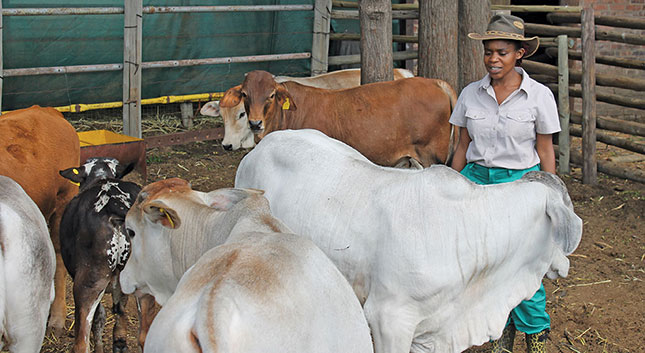
“I want to steer towards breeding with stud selection criteria. I know which male calves I’m going to keep – the Brahman and Bonsmara mixed bull. It has good genes, is beefy and it picks up weight quickly. I want to keep those qualities. I’m still trying to get my formula right. I make an effort to work with a few of the local farmers. I learn so much from these established farmers in my area.”
Dorper production
The flock includes 40 breeding ewes and 20 lambs which are currently being weaned. Male lambs are marketed from the farm while females are retained to increase and replace older ewes in the breeding flock.
“The Waterberg district has a heartwater problem so we monitor the sheep and always have oxytetracycline injectable,” says Thato, who is a member of the Bosveld Dorper Club and secretary of the Waterberg Women Farmers’ Association. “I vaccinate against clostridial diseases and spray supermetrin and deltametrin to control ticks and fleas.”
The farm uses stud standards for breeding. “They give guidelines on how to build proper breeding stock and so keep the best genes in a flock.”
A small apiculture venture
Last year, Thato started a bee farming enterprise by introducing two hives onto the farm. There are now four active hives. “I’m putting up more because bees help with the pollination of crops. Last year I harvested 120kg of honey which I bottled in 350ml containers and sold to friends at R40 each. Next year I want to supply local stores in Modimolle with honey.”
The future
The farm employs five permanent workers and six seasonal staff. Most machinery, such as tractors, harvesters, ridgers and planters, is hired.
“We also hire civil works machinery. When I started, I had to put money into operational assets rather than on fixed assets. I’m in the process of applying for funding to acquire a tractor for daily operations,” Thato says.
Funding assistance is her primary obstacle.
“It’s a challenge getting the right people to listen to you and see the potential of your operation. I know I could do so much if I were given the opportunity to expand. “Looking back, I think I should have put more focus on sourcing the right people with the right skills because a lot of labourers are not skilled and equipped, and this ends up costing you.”
Thato wants to expand her operations and at the same time develop other young people.
“I’ve developed an experiential learning programme that will be accredited by the Agricultural Sector Education and Training Authority next year. We’ll be giving learnerships and graduate placements to local youth and unemployed graduates,” explains Thato.
“I’ll coordinate between the students, moderators and stakeholders. We already have a training team of five: a moderator, an assessor, and three facilitators.”
The programme plans to take in 20 students in April next year. “We’re trying to get the Limpopo Young Farmers’ Association to rally all the youth in farming in the province so that we can share information, network, interact with the provincial department of agriculture and private sector, and look at funding mechanisms. Young people need to gain more access to this field.”
Asked what advice she would give up-and-coming farmers, Thato says that a farm must be run like a business. “I believe in three rules: technical excellence, business excellence, and compliance excellence.”
She says her purpose is to show young black people that they too can farm like her, and that the country can feed itself.
“It’s possible for our own people to feed our nation,” she says.
Phone Thato Moagi on 078 353 7833 or email her at [email protected].
This article was published on 20 November 2015 in farmer’s weekly.






